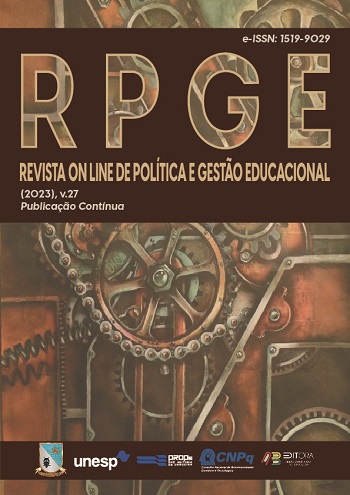Revisiting traditional educational practices in the age of digitalization
DOI:
https://doi.org/10.22633/rpge.v27i00.18527Keywords:
Pedagogy, Covid-19, Digitalization of education, Critical thinking, Modern educationAbstract
During the period of lockdown both students and teachers experienced immersion in the digital environment to the full, what allowed actualizing the so-called “dark” sides of organization of the educational process; those metamorphoses, which traditional roles of a student and a teacher are currently getting exposed to. Post-pandemic realities of education within the contour of Timothy Morton’s dark ecology theory are considered in the present paper. The authors make use of a “hyperobject” concept while studying the introduction of digitalization in the field of education, submitting to extrapolate Morton’s optics to comprehension of educational practices, mediated by digital environment. It is shown in the study, that absorption of traditional educational practices proves to be a limited discourse, where the technological component of digitalization is being merely actualized and the essence of educational process is being simultaneously discredited.
Downloads
References
AUDRAS, D. et al. Virtual teaching assistants: A survey of a novel teaching technology. International Journal of Chinese Education, v. 11, n. 2, 2022. DOI: 10.1177/2212585X221121674.
JOOSTEN, T. et al. Planning for a blended future: A research-driven guide for educators. [Report] Every learner everywhere network. 2021. Disponível em: https://www.everylearnereverywhere.org/resources/planning-for-a-blended-future/. Acesso em: 10 mar. 2023.
KARPOV, A. O. Budushcheye obrazovaniya [The future of education]. Obshchestvennyye nauki i sovremennost', n. 5, p. 115–124, 2018. DOI: 10.31857/S086904990001499-0.
MORTON, T. Realist magic: Objects, ontology, causality. [S. l.]: Open Humanities Press, 2013a.
MORTON, T. Hyperobjects: Philosophy and ecology after the end of the world. Minneapolis, MN: University of Minnesota Press, 2013b.
NIKOLAEVA, Е. M.; SHCHELKUNOV, M. D. Global'noye prostranstvo vysshego obrazovaniya: Osnovnyye trendy i cherty [Global space of higher education: Main trends and features]. Uchenyye zapiski Kazanskogo universiteta. Seriya Gumanitarnyye nauki, v. 157, n. 1, p. 107–117, 2015.
PELLETIER, K. et al. 2022 EDUCAUSE Horizon report. Teaching and learning edition. Boulder, CO: EDUCAUSE, 2022. Disponível em: https://library.educause.edu/-/media/files/library/2022/4/2022hrteachinglearning.pdf?la=en&hash=6F6B51DFF485A06DF6BDA8F88A0894EF9938D50B. Acesso em: 10 mar. 2023.
PERVUKHIN, V. L.; SEDOVA, I. N.; KIRYANOVA, V. A. Perspektivy i riski tsifrovoy transformatsii dopolnitel'nogo professional'nogo obrazovaniya v Rossii i regione [Prospects and risks of digital transformation of additional professional education in Russia and the region]. Bulletin of the International Academy of System Research. Computer Science, Ecology, Economy, n. 23, p. 153–156, 2021.
PLOTNIKOVA, A. L.; BORISOVA, Y. S. Futurologicheskiy vzglyad na budushcheye rossiyskogo obrazovaniya [A futurological view of the future of Russian education]. Izvestiya Samarskogo nauchnogo tsentra Rossiyskoy akademii nauk. Sotsial'nyye, gumanitarnyye, mediko-biologicheskiye nauki, v. 19, n. 5, p. 13–16, 2017.
TECHNAVIO. Coding Bootcamp Market to grow by USD 772.04 mn |41% of Growth to Originate from North America |17000+ Technavio Reports. Jan. 14, 2022. Disponível em: https://www.prnewswire.com/news-releases/coding-bootcamp-market-to-grow-by-usd-772-04-mn-41-of-growth-to-originate-from-north-america-17000-technavio-reports-301460334.html. Acesso em: 10 mar. 2023.
Published
How to Cite
Issue
Section
License
Copyright (c) 2023 Revista on line de Política e Gestão Educacional

This work is licensed under a Creative Commons Attribution-NonCommercial-ShareAlike 4.0 International License.
Manuscritos aceitos e publicados são de propriedade da Revista on line de Política e Gestão Educacional. É vedada a submissão integral ou parcial do manuscrito a qualquer outro periódico. A responsabilidade do conteúdo dos artigos é exclusiva dos autores. É vedada a tradução para outro idioma sem a autorização escrita do Editor ouvida a Comissão Editorial Científica.











